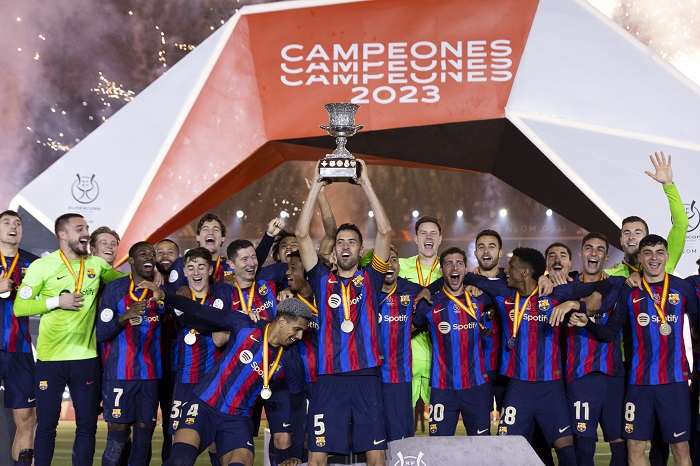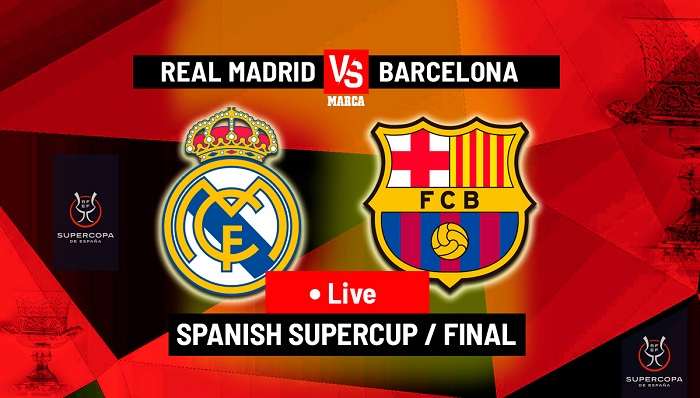What Is the Supercopa de España?

The Supercopa de España is a Spanish football competition traditionally contested between the winners of La Liga (the Spanish top-tier football league) and the Copa del Rey (the primary domestic cup competition in Spain). The match has historically served as a curtain-raiser for the Spanish football season.
However, the tournament has undergone significant changes over the years, evolving into a four-team competition that features not only the winners of La Liga and the Copa del Rey, but also the runners-up of these tournaments.
Origins of the Supercopa de España
The first edition of the Supercopa de España took place in 1982. The initial format was simple: the reigning La Liga champions faced the winners of the Copa del Rey in a two-legged affair, with one leg played at each team’s home stadium. This was a way to see the best teams in Spain compete before the rigors of a long football season.
However, over time, the structure and importance of the Supercopa grew. In the early days, some seasons saw the competition skipped, or the format altered, but by the 1990s, it had become an established part of the football calendar.
Evolution to the Modern Format
In 2019, the Royal Spanish Football Federation (RFEF) introduced a bold new format for the Supercopa de España. The tournament was expanded to four teams, and instead of being a two-legged tie, it became a mini-tournament featuring semifinals and a final. This shift not only increased the prestige of the competition but also provided fans with more thrilling football at the beginning of the year.
Why the Change?
The decision to expand the tournament was driven by several factors:
- Global Appeal: Football is a global sport, and top clubs like Barcelona, Real Madrid, Atlético Madrid, and Valencia have fans worldwide. Expanding the tournament created more high-profile matches, which, in turn, attracted a larger international audience.
- Revenue Generation: More games meant more television rights and sponsorship deals. By increasing the number of participating teams, the RFEF also tapped into a larger pool of commercial opportunities, generating significant revenue for the federation and the clubs involved.
- More Competitive Edge: The new format adds a layer of unpredictability and excitement. Instead of a straightforward two-legged tie, the four-team knockout tournament creates more drama and showcases a broader range of top-tier Spanish football.
The Format Breakdown
The modern Supercopa de España features four teams:
- La Liga champion.
- Copa del Rey champion.
- La Liga runner-up.
- Copa del Rey runner-up.
The semifinal matchups are typically drawn, with the winners of the semifinals advancing to the final. All matches are played as single-legged ties. If the matches end in a draw after 90 minutes, extra time and penalties are used to determine the winner.
Host Venues
In recent years, the Supercopa de España has been held outside of Spain as part of efforts to globalize Spanish football. For example, in 2020 and 2021, the tournament was held in Saudi Arabia. The decision to move the games abroad has generated mixed reactions, with some fans appreciating the global reach and others preferring the tournament to be played on home soil.
The Role of Saudi Arabia
The move to Saudi Arabia was part of a larger deal between the RFEF and the Saudi government, aiming to promote football in the Middle East while also generating significant revenue for Spanish football. The multi-year contract with Saudi Arabia ensures that the tournament remains an attractive international spectacle.
Memorable Moments in Supercopa de España History
Over the years, the Supercopa de España has produced numerous unforgettable moments. From nail-biting finishes to individual brilliance, these moments have added to the lore of this prestigious competition.
The 1997 Thriller
One of the most dramatic Supercopa moments came in 1997 when Barcelona faced Real Madrid. The tie ended with a narrow victory for Barcelona, who won 3-2 on aggregate. The rivalry between the two clubs is legendary, and this match only heightened the intensity between the two sides.
Real Madrid’s Dominance in 2020
With the new four-team format in place, Real Madrid claimed the first modern edition of the Supercopa in 2020 by defeating Atlético Madrid in a tense final. After a 0-0 draw, the match went to penalties, where Real Madrid emerged victorious. This triumph marked the beginning of a new era for the competition.
Messi’s Red Card in 2021
Perhaps one of the most talked-about moments in recent Supercopa history was Lionel Messi’s first-ever red card in his Barcelona career. It came in the 2021 final against Athletic Bilbao, where Messi was sent off for violent conduct in the dying minutes of extra time. Bilbao ended up winning the match 3-2, providing a shocking end to the tournament.
Key Teams and Players
The Supercopa de España has always featured the top Spanish teams, and over the years, certain clubs and players have left their mark on the competition.
Real Madrid: The Supercopa Giants
Real Madrid has been a dominant force in the Supercopa de España, winning the competition numerous times. Their success in the competition has been bolstered by star players like Cristiano Ronaldo, Sergio Ramos, and Karim Benzema, all of whom have played pivotal roles in securing Supercopa titles for Los Blancos.
Barcelona: A Rival to Watch
Barcelona has also enjoyed significant success in the Supercopa de España, often vying with Real Madrid for the title. The presence of players like Lionel Messi, Andrés Iniesta, and Xavi in past tournaments has made Barcelona a consistent favorite to lift the trophy.
Underdogs: Athletic Bilbao and Valencia
While Madrid and Barcelona often steal the headlines, other teams like Athletic Bilbao and Valencia have also had their moments in the Supercopa. Bilbao, in particular, has a rich history in Spanish football and managed to win the 2021 edition, defeating both Real Madrid and Barcelona along the way.
Supercopa de España 2023: A Look Back
The 2023 edition of the Supercopa de España once again brought excitement and drama. The semifinal pairings were drawn, with Real Madrid facing Valencia, and Barcelona squaring off against Real Betis.
Semifinal 1: Real Madrid vs Valencia
Real Madrid’s encounter with Valencia was a tough-fought match. Despite a strong challenge from Los Che, Madrid managed to secure a 2-1 victory, thanks to goals from Karim Benzema and Vinícius Júnior. Valencia, while spirited, could not overcome Madrid’s relentless attack.
Semifinal 2: Barcelona vs Real Betis
In the second semifinal, Barcelona clashed with Real Betis in what turned out to be a thrilling match. Barcelona edged out Betis in a tight 3-2 contest, with Pedri and Ansu Fati leading the charge for the Catalan side.
The Final: Real Madrid vs Barcelona
The final of the 2023 Supercopa de España was another installment of the El Clásico rivalry. Real Madrid and Barcelona met once again, but this time, it was Barcelona who triumphed, with a commanding 3-1 win. Robert Lewandowski played a starring role, scoring two goals and lifting Barcelona to their first Supercopa title in three years.
The Global Impact of the Supercopa de España
The recent global expansion of the Supercopa de España has helped spread the influence of Spanish football beyond Europe. With the tournament being held in locations like Saudi Arabia, it has attracted new fans and brought a fresh dynamic to the competition.
Growing Popularity in the Middle East
The move to Saudi Arabia has sparked significant interest in Spanish football within the Middle East. Football fans in the region have had the chance to witness La Liga giants up close, with many flocking to stadiums to see the likes of Sergio Ramos, Antoine Griezmann, and Gerard Piqué play live.
Controversy Surrounding the Move
Despite its global reach, the decision to host the Supercopa de España in Saudi Arabia has not been without controversy. Critics argue that the tournament should remain in Spain, highlighting issues related to the host nation’s human rights record. The move sparked debates among fans and media alike about the ethics of football’s global expansion.
The Future of the Supercopa de España

As the Supercopa de España continues to evolve, there is no doubt that it will remain a key event in Spanish football. The competition’s ability to adapt, such as with its new format and international hosting, demonstrates the RFEF’s commitment to keeping the Supercopa relevant in an ever-changing football landscape.
Potential Changes
Looking ahead, the format and location of the Supercopa could continue to change. There has been speculation about expanding the competition further or rotating host nations to include other parts of the world, such as the United States or Asia. This would only further enhance the competition’s global reach.
Building on the Four-Team Model
The four-team model has proven to be a success, but the question remains: will more teams be added in the future? For now, the current format seems to strike the right balance between quality and excitement, but with football’s ever-evolving nature, the possibilities are endless.
Related Post:
Exploring “Run 3 Unblocked Games”: A Cosmic Adventure
The Ultimate Guide to Tomb Raider Games in Order: A Journey Through Lara Croft’s Legacy
The Cast of Love Island Games: Meet the Vibrant Personalities Behind the Show
The Supercopa de España is more than just a pre-season warm-up. It has grown into a thrilling and prestigious tournament that showcases the best of Spanish football. With memorable moments, legendary players, and exciting new formats, the competition is poised to continue its tradition of providing unforgettable football. Whether it’s the intense El Clásico matchups or the chance for underdogs to shine, the Supercopa de España remains a must-watch event for football fans across the globe.


